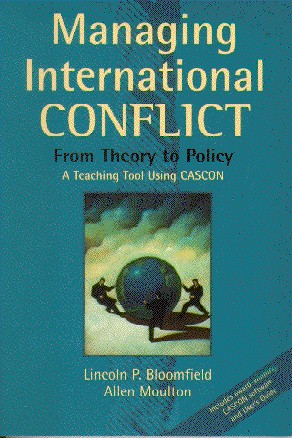Managing International Conflict:
from Theory to Policy
by Lincoln P. Bloomfield and Allen Moulton
including Cascon software
and historical conflict database
St. Martin's Press, New York, 1997
ISBN: 0-312-13675-7

Part I. Understanding Conflict
Chapter 1. Why Conflict?
- Explanations from International Relations Theory
- Violence and Human Nature
- A Note About Language
Chapter 2. The Age of Local Conflict: A Short History
- The Cold War Backdrop
- The Age of "Small Wars"
- Arms and Conflict
- The New World Disorder
- Good News/Bad News
Chapter 3. The Conflict Map: Continuity and Change
- Thinking about the Future
- The Emerging Conflict Agenda
Part II. Managing Conflict
Chapter 4. Heading off Conflicts Before They Happen: Early Warning and Preventive Diplomacy
- First Best: Dispute Settlement and Conflict Resolution
- Three Strategies of "Preventive Diplomacy"
- Early Warning
- The Psychological Barriers to Conflict Prevention
Chapter 5. Policing the Global Neighborhood: Who Does What?
- The United Nations as Conflict Manager
- The Regional Approach: A Possible Solution?
Chapter 6. The Quest for Security: Ideals and Reality
- Enforcement In an Imperfect Community
- Collective Security Against Aggression
- Other International Crimes and Misdemeanors
- A Strategy for the Future
- Redefining US Interests
- Fragments of Community: A Realistic Prescription
Part III. Analyzing Conflict
Chapter 7. The Anatomy of Conflict: Toward a Theory of Conflict Prevention
- The Dynamics of Conflict
- Implications of Theory
- Some Policy Inferences from Theory
- A Suggestive Experiment
Chapter 8. Theory into Practice: The Evolution of Cascon
- The U.S. Government Flirts With Cascon
- The United Nations Takes the Plunge
- Cascon in the University
- Renewed Professional Interest
- Cascon as a Lecture Tool and “Lab” Exercise
Chapter 9. Conflict Analysis With Cascon
- What Kinds of Questions can Cascon Help Answer?
- What Does Cascon Do?
- A Bureaucratic Scenario
- Structuring Conflict History for Cascon Analysis
- Identifying Phases
- Coding Factors
- Historical Analogy
- Finding Patterns in Cascon
- Profile Cases
- Implications for Conflict Management
Chapter 10. The Cascon Users Guide
- Starting a Cascon Session
- Looking at the Database: Cases
- Making User Case Groups
- Looking at the Database: Factors
- Making User factor Groups
- Comparing Cases
- Creating and Revising User Cases
- Using Profile Cases
- Printing
- Some Examples of Analysis With Cascon